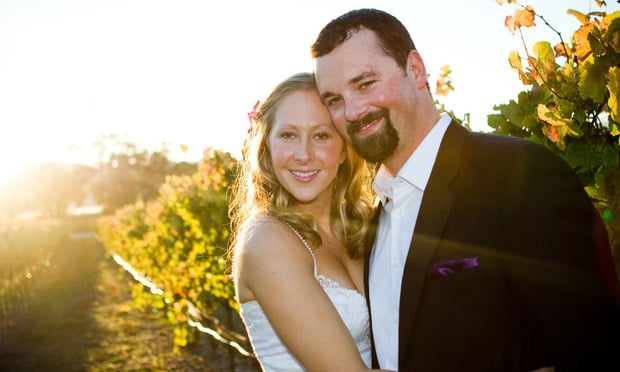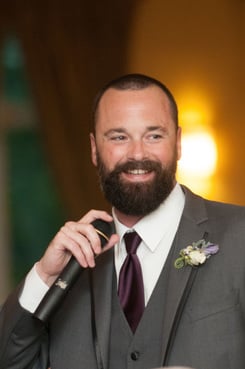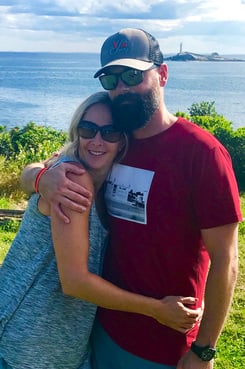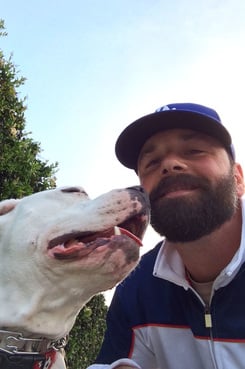'Big Law Killed My Husband': An Open Letter From a Sidley Partner's Widow
The wife of Sidley Austin partner Gabe MacConaill shares her story.
November 12, 2018 at 09:00 AM
12 minute read
 Joanna Litt (left) and Gabriel MacConaill on their wedding day.
Joanna Litt (left) and Gabriel MacConaill on their wedding day.
Joanna Litt's husband, Gabe MacConaill, a 42-year-old partner at Sidley Austin, committed suicide in the parking garage of the firm's downtown Los Angeles office last month.
My husband took his life—our life—on Sunday, Oct. 14, one month to the day before our 10-year wedding anniversary. We had been planning a trip for over a year in anticipation of celebrating.
I'm beyond lost and I don't know how I'm going to get through the rest of my life. Gabe was my best friend, my partner, my lover, and my constant. I turned to him for everything, and he was always there with the most perfect advice and words. He was my world, and after losing him, I can absolutely say, my better half. Gabe and I did not have children (except for our dog Ivy) and we made that deliberate choice so we could focus solely on our life together, because we were happy. And now he's gone. He saw no other choice or path.
I never thought in a million years that he could or would do that. And I keep going back to one thought: "Big Law" killed my husband.
We met on our first day of law school (he graduated third in our class). We had every class together and sat next to each other for two bars because of our last names. He was the smartest person I had ever met. He was also the kindest, most selfless person I've ever met.
I know in my heart that overall, more than anything, we were happy. I would find myself during the day thinking how lucky I was to have him and our life. No one made me feel more special and loved— everything he did, he did for us. And that's why I have this overwhelming need to tell our story, his story. I don't want anyone else to experience the utter shock and pain I am in.
Gabe and I worked hard at our marriage. Marriage isn't easy and I would never pretend it was. Our most serious problem revolved around Gabe's struggle with binge drinking. It wasn't on a daily basis, but maybe three or four times a year there would be some event or function where he drank too much. I was hard on him for it—it made me so uncomfortable and mad and sad when he would cross that line. I didn't have much compassion or realize his drinking was masking a deeper pain and I made him feel very guilty. As a result, he would stop drinking for a month or two and be OK for a while, but then there'd be a lapse.
 Gabriel MacConaill delivering a toast at his brother''s wedding.
Gabriel MacConaill delivering a toast at his brother''s wedding.He saw someone professionally a few times, but that was it. In his way, he was working on it— and that meant a lot to me, so we stayed together.
Then there were a series of ill-fated events at work. First, his mentor and confidant suddenly announced he was leaving the firm. This had a huge impact on Gabe personally. It also caused a big shake up at the firm, and another of his treasured partners left to take early retirement.
Gabe, thrust suddenly into an important leadership role, was told in no uncertain terms that the firm was not going to hire any lateral support. Shortly thereafter, the last partner who was senior to Gabe decided to leave, and an associate whom Gabe spent a lot of time mentoring also left. The Los Angeles bankruptcy group Gabe had so deeply cherished and relied on for support had fallen apart.
It was also during this time that Gabe was asked to chair the summer associate program. Sidley's position in some rankings had fallen and Gabe poured his heart and soul into that program. I know there were many others that helped him, but he passionately assumed responsibility for all 13 candidates, wanting to make sure they had the professional summer experience of a lifetime and wouldn't hesitate to accept an offer from the firm. The success of the program was overwhelming and he didn't even tell me. I found out from someone after he died that the associate reviews were glowing.
Finally, Gabe started working on the Mattress Firm case—a huge bankruptcy. It was a little over a month away from filing a Chapter 11 petition, and I had never seen him so stressed out and anxious. He was trying not to burden me with what was going on, but he wasn't sleeping, I hadn't seen him smile in weeks, and most everything he said was negative.
He told me he had experienced stress during cases before, but it had never been this bad. I didn't know what to do. I tried to be positive and encouraging and just make our home as pleasant a place to come home to as possible.
 Gabriel MacConaill and Joanna Litt recreating their engagement photo.
Gabriel MacConaill and Joanna Litt recreating their engagement photo.The Sunday before leaving to file in Delaware, he spent all day at the office. When I finally called him that evening, it was clear he was in distress and had been working himself to exhaustion. He told me his body was failing him. I picked him up and we decided he should go to the emergency room. He actually said to me on the way there, "You know, if we go, this is the end of my career."
I've never felt so helpless in my life. I didn't know whom to reach out to or to tell my husband was in crisis. I called his closest colleague and asked if she had noticed anything unusual with his behavior at work. She said he was working more with his door closed, and then she said something I'll never forget: She said his sense of humor had been gone for a while. I asked her to keep an eye on him at work and then I just brought him home. I tried to make sure he slept and was rehydrating and eating so he could make the trip to Delaware.
About a week later Mattress Firm publicly filed. I sent an article announcing the bankruptcy to my mom and a couple of close friends with the exact words, "This is the case that is killing my husband."
Gabe came home from Delaware late Tuesday evening. I was hoping the worst was over, but he wasn't any better. I convinced him to skip a conference in Los Angeles that he was supposed to attend that Wednesday and Thursday and we stayed home together. I thought this would do him some good, but what I found out later was that he had stopped responding to work emails. And when he told me he was going into work that Friday, he instead spent the day at his biological father's grave—a man he never met—a couple of hours away from our home.
During this terrible spiral, I told him to quit. I told him we could sell our beautiful house and move to Mammoth, our happy place, and snowboard all winter and then figure it out. He said he couldn't quit in the middle of a case. The irony is not lost on me that he found it easier to kill himself. I thought after this case was over, we'd find a path back to being happy.
Suicide has now become my new world and I am desperately searching for answers. Because to those that knew him best, his family, friends and colleagues, this came without warning. Though it's only the beginning stages of trying to figure out why this happened, I came across a concept, maladaptive perfectionism, that combines unrealistic standards of achievement with hypercriticism of failing to meet them.
Gabe displayed most if not all of the characteristics. Simply put, he would rather die than live with the consequences of people thinking he was a failure.
 MacConaill with his dog Ivy.
MacConaill with his dog Ivy.Looking back on the things Gabe confided in me, I now know I missed a lot of signs. He told me he felt like he was doing the work of three people—and I think that's being generous. He told me the deal to resolve the bankruptcy kept changing. He also felt that while a senior partner in Chicago was heading the case, a lot of pressure fell directly on him.
We spoke a handful of times about how he should just try to care less about the work, but knowing the kind of person my husband was, that was never going to happen. He said he felt like a phony who had everyone fooled about his abilities as a lawyer, and thought after this case was over, he was going to be fired—despite having won honors for his work.
On the morning he killed himself, he said he got an email and had to go into work to put something together. I wanted to ask if I could go with him and just sit there, but instead, I simply offered to make him a sandwich for lunch. And without any hesitation, he said, "No baby, I'll be fine—I won't be long." I'll be haunted by those words forever. He gave me a few kisses, and tried to get Ivy to come cuddle me.
And then he left, taking his gun with him, and shot himself in the head in the sterile, concrete parking structure of his high-rise office building.
I feel like I lost my husband so quickly—within the course of a month—but I'm now starting to realize how hard he must have been on himself all the time. The constant striving to be perfect at work, to be the perfect husband, son, uncle, brother and friend. And then living with this deep unbearable shame that he wasn't performing to the impossibly high standards he set for himself. He said a few times how he couldn't turn off his head, but again, I didn't understand the severity of that statement.
Maladaptive perfectionists lack self-compassion. I should have held him just a little longer, loved him a little harder, and told him way more often how proud I was of him and how much I loved him—exactly as he was. I'll make penance for this for the rest of my life and for just not seeing the depth of the sorrow and pain he was going through.
Then came Sidley's handling of Gabe's suicide—"damage control" that included a last-minute invitation for me and my mom to attend a service at the firm. We went because I needed to see what kind of narrative they were creating. There were a handful of attorneys there, but in the immense receiving line of people who patiently waited to tell us about their unique story of Gabe, most were support staff. One told me that after working at the firm for years, Gabe was the only attorney to take the time to know her name.
I heard story after story about Gabe's encouraging nature and how he made people feel like they could succeed at anything they put their mind to. One close colleague said she wished "Gabe had his own Gabe."
Finally, packing up his office, I was handed a gift left by someone who just missed saying goodbye to him. He had decided to go to law school after numerous discussions with Gabe. The gift was a leather plaque; on it was inscribed, "It Can Be Done."
Gabe lived his life with integrity and treated those around him with sincerity, kindness, and a genuine sense of presence. Unfortunately, I know my husband died not knowing the impact he had on so many people. I believe he died feeling overworked, inferior and undervalued. And I know he died with a lot of shame.
So as I write our story and think about it more and more, I know "Big Law" didn't directly kill my husband—because he had a deep, hereditary mental health disorder and lacked essential coping mechanisms. But these influences, coupled with a high-pressure job and a culture where it's shameful to ask for help, shameful to be vulnerable, and shameful not to be perfect, created a perfect storm.
I don't have any immediate solutions, but for the sake of retaining people like Gabe in these important professions, something needs to change. We need people like him walking this earth; they make it a better place. My husband was impeccable with his word, and actually cared so immensely about the job he did and how people viewed him. He wasn't focused on the bottom line or lining his pockets with more money. He cared about his clients and the hundreds and thousands of people impacted by a corporation filing bankruptcy. Not to mention, he was really good at what he did.
I was having a hard time getting older. I'm 41 and would think about how time was flying by. We weren't as young or vibrant. I feel like I've answered the age-old question how do you make time slow down. You lose the love of your life. Now, there's just so much time left, and infinite sadness. I'll live the rest of my life trying to fill his shoes and help anyone from having to go through this horrendous, needless experience.
Read More: As Attorney Suicides Mount, a Survivor Speaks Out
Free, confidential services for people in suicidal crisis or emotional distress, or those around them, exist 24/7. The National Suicide Prevention Lifeline is at 1-800-273-TALK (8255). A crisis text line is at 741-741. The American Bar Association has a directory of lawyer assistance programs.
NOT FOR REPRINT
© 2025 ALM Global, LLC, All Rights Reserved. Request academic re-use from www.copyright.com. All other uses, submit a request to [email protected]. For more information visit Asset & Logo Licensing.
You Might Like
View All
Sheppard Mullin Expands in Dallas With 6-Lawyer White Collar Team From Bradley
3 minute read
Longtime Reed Smith Health Care Partner Opts for Solo Practice Over Retirement
3 minute read
Working Across the 'Entire Ecosystem' Propels Ropes & Gray's Life Sciences Practice

Fatal Shooting of CEO Sets Off Scramble to Reassess Executive Security
5 minute readTrending Stories
- 1Relaxing Penalties on Discovery Noncompliance Allows Criminal Cases to Get Decided on Merit
- 2Reviewing Judge Merchan's Unconditional Discharge
- 3With New Civil Jury Selection Rule, Litigants Should Carefully Weigh Waiver Risks
- 4Young Lawyers Become Old(er) Lawyers
- 5Caught In the In Between: A Legal Roadmap for the Sandwich Generation
Who Got The Work
J. Brugh Lower of Gibbons has entered an appearance for industrial equipment supplier Devco Corporation in a pending trademark infringement lawsuit. The suit, accusing the defendant of selling knock-off Graco products, was filed Dec. 18 in New Jersey District Court by Rivkin Radler on behalf of Graco Inc. and Graco Minnesota. The case, assigned to U.S. District Judge Zahid N. Quraishi, is 3:24-cv-11294, Graco Inc. et al v. Devco Corporation.
Who Got The Work
Rebecca Maller-Stein and Kent A. Yalowitz of Arnold & Porter Kaye Scholer have entered their appearances for Hanaco Venture Capital and its executives, Lior Prosor and David Frankel, in a pending securities lawsuit. The action, filed on Dec. 24 in New York Southern District Court by Zell, Aron & Co. on behalf of Goldeneye Advisors, accuses the defendants of negligently and fraudulently managing the plaintiff's $1 million investment. The case, assigned to U.S. District Judge Vernon S. Broderick, is 1:24-cv-09918, Goldeneye Advisors, LLC v. Hanaco Venture Capital, Ltd. et al.
Who Got The Work
Attorneys from A&O Shearman has stepped in as defense counsel for Toronto-Dominion Bank and other defendants in a pending securities class action. The suit, filed Dec. 11 in New York Southern District Court by Bleichmar Fonti & Auld, accuses the defendants of concealing the bank's 'pervasive' deficiencies in regards to its compliance with the Bank Secrecy Act and the quality of its anti-money laundering controls. The case, assigned to U.S. District Judge Arun Subramanian, is 1:24-cv-09445, Gonzalez v. The Toronto-Dominion Bank et al.
Who Got The Work
Crown Castle International, a Pennsylvania company providing shared communications infrastructure, has turned to Luke D. Wolf of Gordon Rees Scully Mansukhani to fend off a pending breach-of-contract lawsuit. The court action, filed Nov. 25 in Michigan Eastern District Court by Hooper Hathaway PC on behalf of The Town Residences LLC, accuses Crown Castle of failing to transfer approximately $30,000 in utility payments from T-Mobile in breach of a roof-top lease and assignment agreement. The case, assigned to U.S. District Judge Susan K. Declercq, is 2:24-cv-13131, The Town Residences LLC v. T-Mobile US, Inc. et al.
Who Got The Work
Wilfred P. Coronato and Daniel M. Schwartz of McCarter & English have stepped in as defense counsel to Electrolux Home Products Inc. in a pending product liability lawsuit. The court action, filed Nov. 26 in New York Eastern District Court by Poulos Lopiccolo PC and Nagel Rice LLP on behalf of David Stern, alleges that the defendant's refrigerators’ drawers and shelving repeatedly break and fall apart within months after purchase. The case, assigned to U.S. District Judge Joan M. Azrack, is 2:24-cv-08204, Stern v. Electrolux Home Products, Inc.
Featured Firms
Law Offices of Gary Martin Hays & Associates, P.C.
(470) 294-1674
Law Offices of Mark E. Salomone
(857) 444-6468
Smith & Hassler
(713) 739-1250









